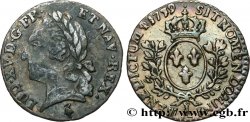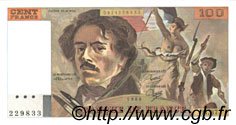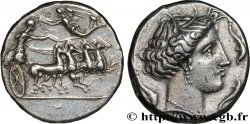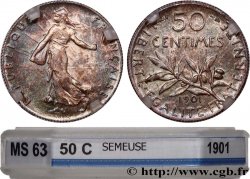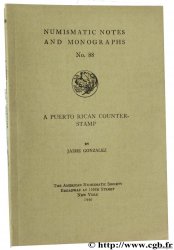Лицевая сторона
Аверс: легенда: LUDOV. XVI. - D. GRATIA..
Аверс: описание: Tête de Louis XVI à gauche, les cheveux noués par un ruban ; au-dessous (Mm).
Аверс: перевод: (Louis XVI, par la grâce de Dieu).
Обратная сторона
Реверс: легенда: (MG) FRANCIÆ ET - R - NAVARRÆ REX 17-91.
Реверс: Описание: Écu de France couronné.
Реверс: перевод: (roi de France et de Navarre).
Историческая справка
LOUIS XVI
(05/10/1774-01/21/1793)
Born in Versailles in 1754, Louis XVI was the son of Louis, Dauphin of France, and Marie-Josèphe de Saxe. In 1774, king on the death of his ancestor Louis XV, he called to his side the old count of Maurepas, disgraced since 1749, and soon separated from the ministers of his predecessor, this "triumvirate" formed by the chancellor Maupeou, the Abbé Terray and the Duc d'Aiguillon, who, through his authoritarian policy, had just restored the royal authority. The old Parliament of Paris, abolished since 1770, was restored. On August 24, 1774, Louis XVI dismissed Terray and appointed Turgot Comptroller General of Finances. Refusing to be a simple "money collector" during his ministry, Turgot multiplied the economic reforms. At the end of 1775, the Comptroller General had begun financial recovery: taxes brought in 327 million, 67 more than the previous year; the deficit was reduced to 15 million. But his plans hurt too many vested interests. Everything was against him: the devotees, the parliaments, the Choiseul party, Queen Marie-Antoinette, whose role was incredibly harmful, the Court, the financiers. He needed the support of an enlightened despot, and Louis XVI was neither despot enough nor enlightened enough.. The revolt of the English colonies in America, in 1775, heated the spirits in France. A whole party wanted to erase the memory of the disastrous Seven Years' War. On May 9, 1776, a secret council, from which Turgot was excluded, decided to enter the war; on the 12th, the Comptroller General was dismissed at the same time as the Keeper of the Seals Malesherbes, after a ministry of less than two years. Thanks to French help, the insurgents prevailed in America and the Treaty of Versailles (1783) recognized the independence of the United States.. But France had gained little in this war which increased the financial distress of the State. Necker, successor to Turgot from 1777 to 1781, also had to give way before the coalition of the privileged. With the financial crisis worsening, the king summoned an Assembly of Notables (1787), which refused the necessary changes. Necker, recalled to business (1788), had the king decide to convene the States General, the first since 1614. The first part of the reign of Louis XVI was marked by numerous reforms: establishment of the Mont-de-Piété (1777), abolition of serfdom in the royal domain (1779), abolition of the preparatory question (1780), creation of the school of mines (1783), beginning of the dyke of Cherbourg and the Canal du Center (1784), freedom of the grain trade (1787), edict of tolerance in favor of Protestants (1788). In generalities, a generation of high-class intendants continued the work of their predecessors during the reign of Louis XV.. But these reforms were not enough to stop the march of time. When it appointed its representatives, the nation disavowed the enlightened administrators from the Council and the intendancies. From 1789 to 1792, in three short years, the ancient political and social edifice crumbled irreparably. The giant of the Grand Siècle had lived. Opened on May 5, 1789, the States General declared themselves the National Assembly on June 17 and, on August 4, abolished the old privileges. However, the king's brothers left France. In October, the royal family was brought back to Paris and the Assembly followed it there: henceforth, the history of France was going to be written in the capital.. The Revolution continued, and, as time passed, Louis XVI, who only approved by mouth the transformations in progress, was no more than the plaything of events.. Brought back to Paris after the failure of his flight abroad (June 1791), he had to sanction the new constitution which reduced him to the rank of first civil servant of the State.. The war against Austria, desired by Louis XVI (April 1792), precipitated the fall of the regime. Accused of duplicity, the king was overthrown by the Parisian riot and the Legislative Assembly had to endorse the abolition of the monarchy (August 10, 1792) before giving way to a National Convention. It was before this body that the trial of the king took place (December 1792-1793), who, condemned to death, was executed on January 21, 1793.. With the reign of Louis XVI, the history of the French monarchy really comes to an end.. No doubt there will still be kings of France, a Restoration, this "comedy of fifteen years", a king of the French, two emperors, no doubt it will take France a century to establish itself definitively as a Republic, but it It was in 1792 that the chain of time, uninterrupted for fifteen centuries, was broken, at the same time as the bond of love between the monarch and his subjects was broken.. Constantly inferior to their task since their accession to the throne, Louis XVI and his wife showed exceptional dignity and courage as soon as they descended from it.. Their long martyrdom, from August 1792 to July 1793, crowns the destiny of a monarchy which, since its birth, had prided itself on being entirely Christian..








 Cообщить об ошибке
Cообщить об ошибке Распечатать страницу
Распечатать страницу Отправить мой выбор
Отправить мой выбор Задать вопрос
Задать вопрос Consign / sell
Consign / sell
 Информация
Информация
